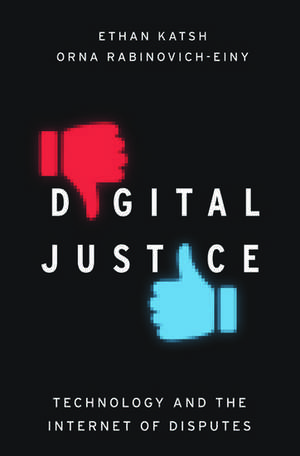Digital Justice: Technology and the Internet of Disputes
Autor Ethan Katsh, Orna Rabinovich-Einyen Limba Engleză Paperback – 27 apr 2017
| Toate formatele și edițiile | Preț | Express |
|---|---|---|
| Paperback (1) | 238.61 lei 31-37 zile | |
| Oxford University Press – 27 apr 2017 | 238.61 lei 31-37 zile | |
| Hardback (1) | 643.49 lei 31-37 zile | |
| Oxford University Press – 6 apr 2017 | 643.49 lei 31-37 zile |
Preț: 238.61 lei
Preț vechi: 270.81 lei
-12% Nou
Puncte Express: 358
Preț estimativ în valută:
45.67€ • 49.63$ • 38.39£
45.67€ • 49.63$ • 38.39£
Carte tipărită la comandă
Livrare economică 09-15 aprilie
Preluare comenzi: 021 569.72.76
Specificații
ISBN-13: 9780190675677
ISBN-10: 0190675675
Pagini: 264
Dimensiuni: 231 x 155 x 15 mm
Greutate: 0.36 kg
Editura: Oxford University Press
Colecția OUP USA
Locul publicării:New York, United States
ISBN-10: 0190675675
Pagini: 264
Dimensiuni: 231 x 155 x 15 mm
Greutate: 0.36 kg
Editura: Oxford University Press
Colecția OUP USA
Locul publicării:New York, United States
Recenzii
Digital Justice is a must read for anyone who wants to know about how our lives are now affected by the real conflicts produced on the Internet. This book brilliantly examines how technology can be harnessed to prevent, resolve, and also produce conflict in ecommerce, healthcare, social relationships, work, and the legal system itself, illuminating the differences between the potential of digital justice and the concerns of digital injustice.
Digital Justice is the perfect guide to understanding the future of access to justice. The future is digital, not imposing courthouses. This book provides a bold and creative vision of why we need new technology-supported dispute resolution institutions.
Katsh and Rabinovich-Einy explain how technology makes disputes online more likely to occur, and they identify ways in which that can change - indeed, technology can be used to prevent online disagreements in the first place. This book provides a roadmap for a better online experience. It gives us hope that going online need not entail going downhill.
We need an accessible and reasonably priced system for all and I have found no more promising option for that future than that offered by various types of Online Dispute Resolution. Lawyers should surely be the pioneers in upgrading justice rather than standing in the way of processes that, as Ethan and Orna so compellingly show, are great improvements on what we have today. I wish this work the very great success that it deserves. (From the Foreword)
[This] once-in-a-decade book... is in equal parts descriptive, analytical and visionary. While [it] is certainly of great importance to anyone dealing in conflict engagement and resolution, its implications range far beyond this field; anyone in the fields of law, management, e-commerce, social media, customer relations, internet innovation, and public policy, would do well to read this book. Having finished the book, I can't wait for the sequel to come out (or, in academic terms, a second edition). Change happens much faster than it used to; in a few short years, many of the projects described in the book will have come to fruition and provide data, and new horizons for Digital Justice will have emerged as innovations in technology and interaction continue to result in conflict and problems requiring solutions.
The short message is: read this book... it is an invaluable account of the history of Online Dispute Resolution (ODR) authored, in part, by Professor Katsch, one of the great granddaddies of the subject from its beginnings with e-Bay.
Digital Justice is the perfect guide to understanding the future of access to justice. The future is digital, not imposing courthouses. This book provides a bold and creative vision of why we need new technology-supported dispute resolution institutions.
Katsh and Rabinovich-Einy explain how technology makes disputes online more likely to occur, and they identify ways in which that can change - indeed, technology can be used to prevent online disagreements in the first place. This book provides a roadmap for a better online experience. It gives us hope that going online need not entail going downhill.
We need an accessible and reasonably priced system for all and I have found no more promising option for that future than that offered by various types of Online Dispute Resolution. Lawyers should surely be the pioneers in upgrading justice rather than standing in the way of processes that, as Ethan and Orna so compellingly show, are great improvements on what we have today. I wish this work the very great success that it deserves. (From the Foreword)
[This] once-in-a-decade book... is in equal parts descriptive, analytical and visionary. While [it] is certainly of great importance to anyone dealing in conflict engagement and resolution, its implications range far beyond this field; anyone in the fields of law, management, e-commerce, social media, customer relations, internet innovation, and public policy, would do well to read this book. Having finished the book, I can't wait for the sequel to come out (or, in academic terms, a second edition). Change happens much faster than it used to; in a few short years, many of the projects described in the book will have come to fruition and provide data, and new horizons for Digital Justice will have emerged as innovations in technology and interaction continue to result in conflict and problems requiring solutions.
The short message is: read this book... it is an invaluable account of the history of Online Dispute Resolution (ODR) authored, in part, by Professor Katsch, one of the great granddaddies of the subject from its beginnings with e-Bay.
Notă biografică
Ethan Katsh is Professor Emeritus of Legal Studies at the University of Massachusetts Amherst and Director, National Center for Technology and Dispute Resolution. He is one of the founders of the field of Online Dispute Resolution and has published widely in the law and technology and dispute resolution fields. He authored Law in a Digital World (Oxford, 1995); The Electronic Media and the Transformation of Law (Oxford, 1989); Online Dispute Resolution: Resolving Conflicts in Cyberspace (Co-authored with Janet Rifkin, 2001).Orna Rabinovich-Einy is an associate professor (senior lecturer) at the Faculty of Law at the University of Haifa. Her areas of expertise are alternative dispute resolution, online dispute resolution, and civil procedure, with research focusing on the relationship between formal and informal justice systems, dispute resolution system design and the impact of technology on dispute resolution.
























